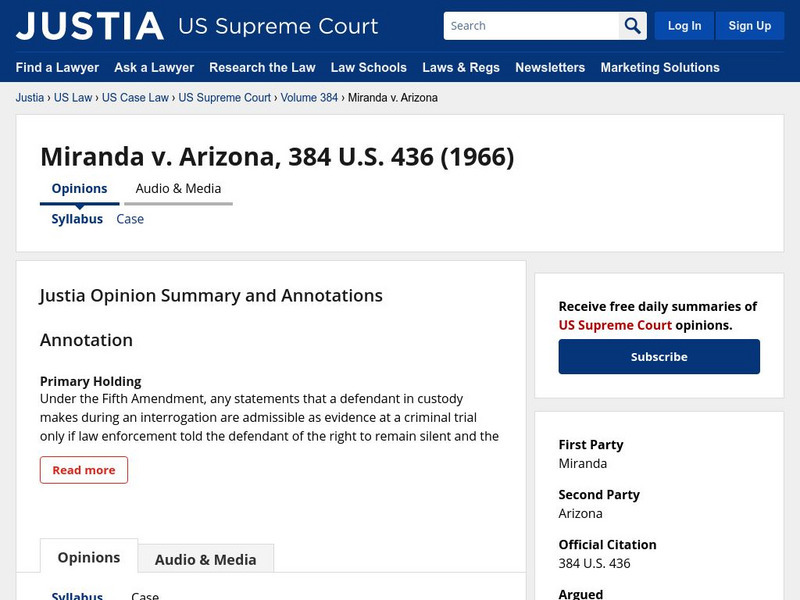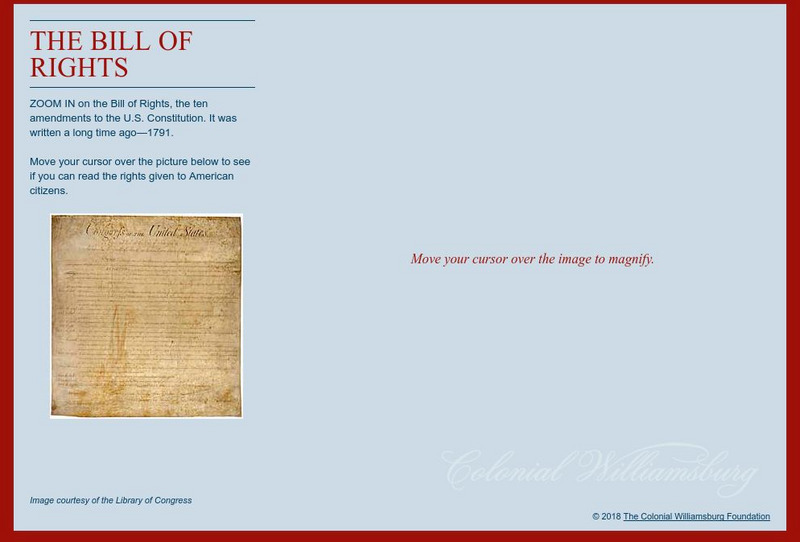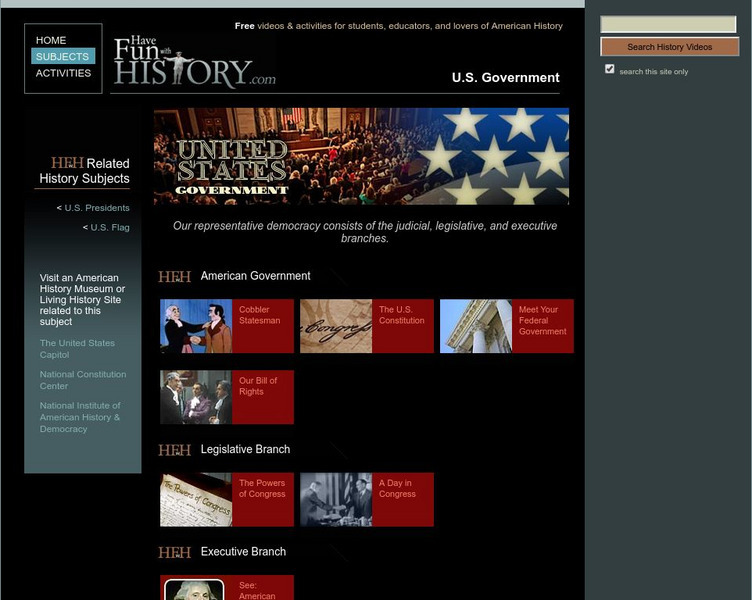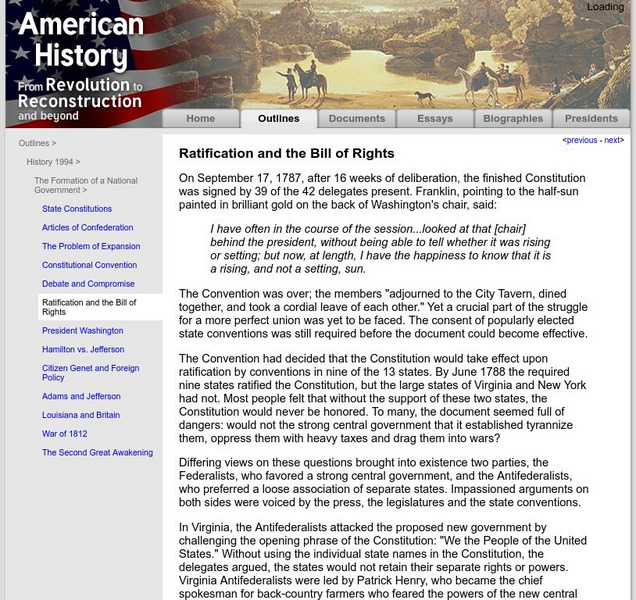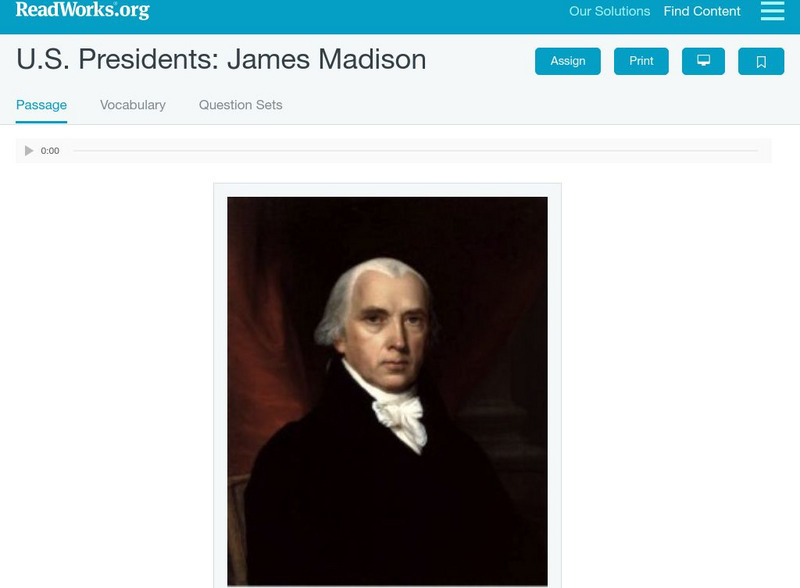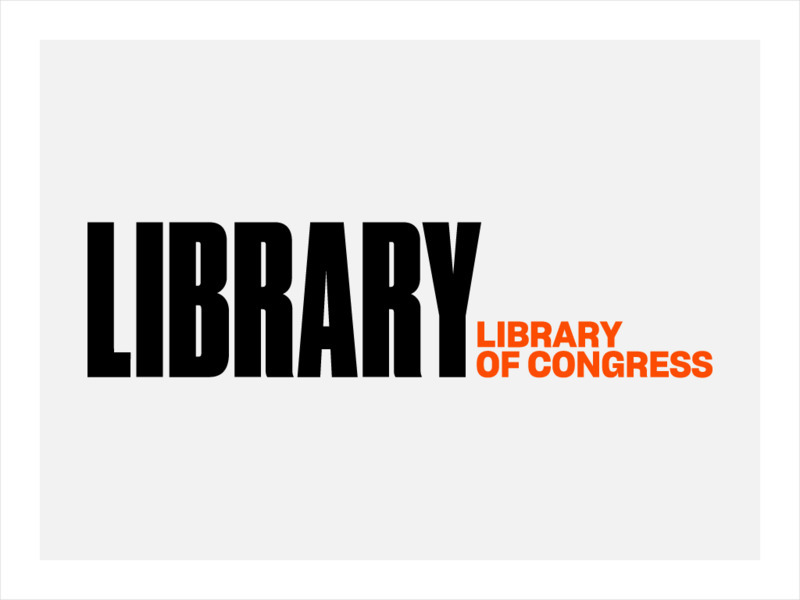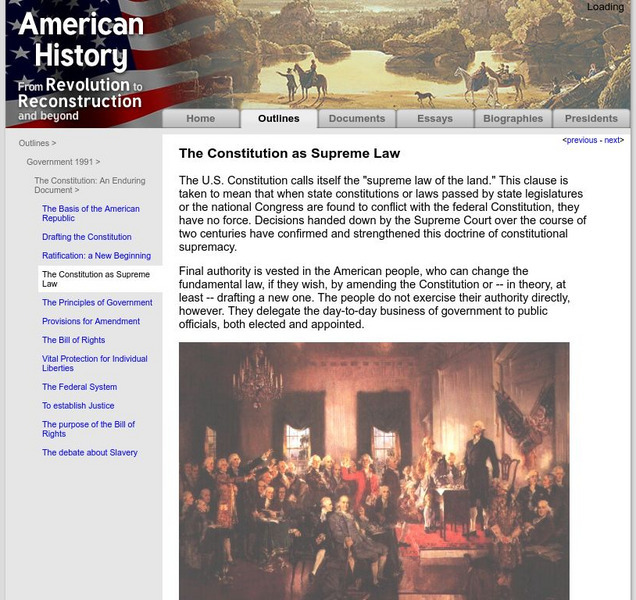Thomson Reuters
Find Law: u.s. Constitution: Nineteenth Amendment
This resource provides the 19th Amendment and a short history of the women's suffrage movement state by state.
Teaching American History
Teaching American History: From Bullets to Ballots Chapter 2
John Zvesper's second chapter in his book, From Bullets to Ballots: The Election of 1800 and the First Peaceful Transfer of Political Power discusses the Lessons in Constitution Making.
National Women’s History Museum
National Women's History Museum: Landmark Supreme Court Cases
Learners will analyze one of four Supreme Court cases that relate to the constitutional rights of women decided between 1908-2005. Students will become mini-experts on one Supreme Court cases and they will be exposed to the content,...
Other
U.s. Supreme Court: Miranda v. Arizona, 384 u.s. 436 (1966)
A complete and in-depth history of the 1966 U.S. court case of Miranda v. Arizona.
Colonial Williamsburg Foundation
The Colonial Williamsburg Foundation: The Bill of Rights
Take a close look at the United States Bill of Rights, the ten amendments to the U.S. Constitution. It was written a long time ago-1791. Move your cursor over the picture below to see if you can read the rights given to American citizens.
US Government Publishing Office
U.s. Government Publishing Office: Constitution of the United States of America: 16th Amendment Income Tax [Pdf]
Read this text of the 16th Amendment, followed by the history of the Amendment and an analysis. (PDF)
Other
Charleston County Public Library: Charles Pinckney and the U. S. Constitution
A good biography on Pinckney and his role in the formation of the Constitution.
Have Fun With History
Have Fun With History: u.s. Government
Module with numerous videos and links to living history sites on topics in American Government, including the Constitution, the three branches, federalism and an array of other topics.
US Government Publishing Office
Ben's Guide to u.s. Government: The Articles of Confederation, 1781
Gives a nice history of the Articles and also a summary of what they were and the problems that developed with their adoption. Includes links to the actual document.
Khan Academy
Khan Academy: Ap Us History Period 3: 1754 1800: The American Revolution
This Khan Academy resource provides video lessons, detailed notes, and practice questions for the AP U.S. History Exam. The years 1754-1800 are covered.
National Cable Satellite Corporation
C Span Classroom: Free Resources for Teaching Civics and u.s. Government
This is a site filled with current events that make connections to the relevant historical topics. There are six clickable topics, the videos of which are updated weekly. RealPlayer is needed and registration is required to stream or...
Constitutional Rights Foundation
Constitutional Rights Foundation: The Constitution and Slavery
Article and questions for discussion on the controveries surrounding slavery while writing the U.S. Constitution and forming a new U.S. government.
University of Groningen
American History: Outlines: Ratification and Bill of Rights
This site is provided for by the University of Groningen. Learn about the struggle for approval by the states of the U.S. Constitution, continuous disagreements after the Constitutional Convention between the Federalists and the...
University of Groningen
American History: Outlines: The Basis of the American Republic
Overview of the U.S. Constitution as the supreme law of the land enduring through changing times and ever increasing diversity over the last two centuries.
Read Works
Read Works: u.s. Presidents James Madison
[Free Registration/Login Required] An informational text about James Madison, the fourth President of the United States. A question sheet is available to help students build skills in reading comprehension.
University of Groningen
American History: Outlines: The Supreme Court
Discussion overview illustrating the structure and powers of the Supreme Court as written in the U.S. Constitution.
A&E Television
History.com: When the Supreme Court Ruled a Vaccine Could Be Mandatory
In 1901 a deadly smallpox epidemic tore through the Northeast, prompting the Boston and Cambridge boards of health to order the vaccination of all residents. But some refused to get the shot, claiming the vaccine order violated their...
Library of Congress
Loc: Primary Documents in American History: United States Constitution
A compendium of primary resources that are valuable pieces of American history, as well as exhibitions, teaching resources, and bibliographies. Together, this site is a goldmine of materials for studying constitutional history.
University of Groningen
American History: Outlines: The Constitution as Supreme Law
Overview of the history and structure of the U.S. Constitution as the "supreme law" of the land of which state and federal laws may not conflict and can only be changed by the American people.
Independence Hall Association
U.s. History: Antifederalists
The Anti-federalists, those who opposed the ratification of the Constitution, were a diverse group. They did have specific fears about carrying out the precepts of the Constitution. Read about their fears, especially the main one, no...
Digital History
Digital History: Hamilton and Jefferson the Men and Their Philosophies [Pdf]
Thomas Jefferson and Alexander Hamilton played a huge role not only in crafting important documents in U.S. history, but also by serving as secretaries in George Washington's first cabinet. Read about their diametrically opposing...
PBS
Pbs Teachers: u.s. Constitution and the Idea of Compromise (Lesson Plan)
In this lesson, examine many of the opposing viewpoints held by founding fathers as they considered various compromises that made the U.S. Constitution possible, including the three-fifths compromise made to placate slave-owning states.
New York Times
New York Times: Crossword Puzzle: u.s. Congress
The New York Times Learning Network has developed many interactive & printable crossword puzzles. This one is on the U.S. Congress.
Teaching American History
Teaching American History: Bill of Rights
Enrich learning about the U.S. Constitution's Bill of Rights with the help of this comprehensive resource. Find details about the amendments added to the new national document.





